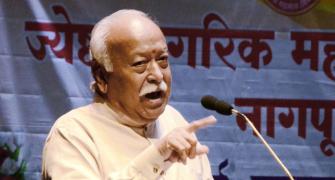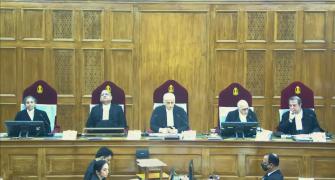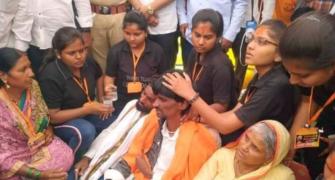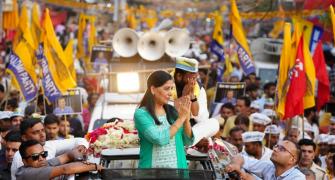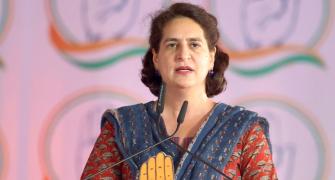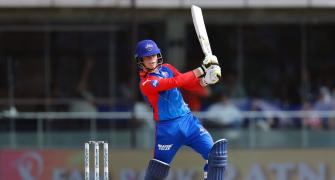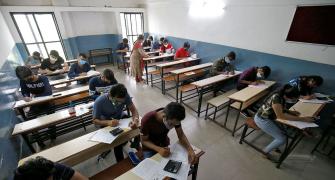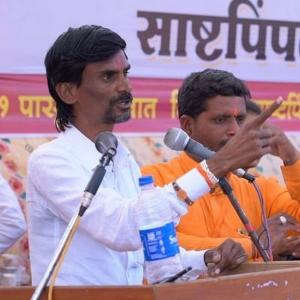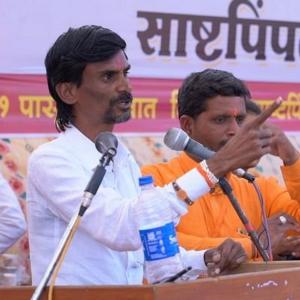'Since September 1, a senior cabinet minister has been to-ing and fro-ing between Jalna and Mumbai by chartered flight every single day with messages from the two deputy chief ministers and the chief minister to get Manoj Jarange-Patil to back down from his agitation.'

News21 founder-editor and senior political observer from Maharashtra Vivek Bhavsar in conversation with Prasanna D Zore/Rediff.com discusses the reasons that catapulted a 41-year-old, unassuming, protester named Manoj Jarange-Patil as the face of Marathas fighting for reservations for the community in the state.
"Jarange-Patil's rise to fame closely resembles the rise of Hardik Patel," says Bhavsar comparing the Maratha agitator with the the young leader from the Patidar community in Gujarat who had launched an agitation against the Bharatiya Janata Party government in Gujarat demanding reservations for the Patel community in government jobs and educational institutions.
'He was never an aggressive agitator'
His agitations have been non-political and he did not have any link with any political party. He was active with a Maratha organisation headed by Purushottam Khedekar and actively worked for the Maratha Sanghatna before starting his own organisation, Shivba.
Since 2011 he was actively involved with various agitations including reservations for Marathas in government jobs and educational institutions. He would launch an agitation, but would soon call it off after meeting political leaders.
Recently, he had started an agitation in Yeola in Nashik district when one of the top influential ministers in the Eknath Shinde-Devendra Fadnavis-Ajit Pawar-government warned the district collector to not accept his petition.
Since Jarange-Patil was gaining popularity this was a useless ploy to sideline him. He got the whiff of this minister's move and hugely upset with this slight, Jarange-Patil vowed at a public meeting in Yeola that despite peaceful protests if the government was being obstinate in accepting even a written petition then he would soon have the entire Cabinet at his feet.
True to his word he began a hunger strike at Antarwali Sarati village in Ambad taluka of Jalna district on August 29. Just 10 days before he started this agitation he had petitioned the Eknath Shinde government to accept his demand to accept Marathas from Marathwada, who were documented as Kunbis (an OBC caste that currently gets reservations in government jobs and educational institutions) during the reign of Nizam of Hyderabad be given the status of Kunbis too.
This agitation by Jarange-Patil had not made any explicit demand for reservations for Marathas, but only asked for incorporation of Marathas from the Marathwada region as Kunbis.
But the Shinde government took him lightly and ignored his demand even as they kept assuring him that his demand will be considered.
Originally hailing from Beed district, the lanky 41 year old, sporting a salt-and-pepper beard and a thick crop of hair had moved to Jalna in search of better livelihood opportunities.
This time as he began his hunger strike he got significant support from neighbouring villages. Interestingly, the district police decided to take him on and attempted to forcibly evict him to a hospital as four days (from August 29 to September 1) of hunger strike was taking a toll on his health.
What happened on September 1?
While Shiv Sena (Uddhav Balasaheb Thackeray) MP Sanjay Raut is claiming that 'someone from Mantralaya (the state secretariat)' called the Jalna SP to play hardball with Jarange-Patil, the counter conspiracy theorists point at Sharad Pawar's hand in fomenting trouble in Jalna.
A video has surfaced where a policeman could be seen dragging a young Maratha agitator by his collar and beating him up in front of Jarange-Patil's supporters at the site of the agitation.
This action was unwarranted as the agitators were protesting peacefully.
Earlier, the district administration had suddenly asked for extra reinforcements from neighbouring villages laced with lathis and protective shields raising many an eyebrows about the intention of the district administration.
Under these circumstances the young Maratha agitators got angry when they saw one of theirs being roughed up by a cop. The situation soon turned scary as cops used more aggression to control the situation.
And then the forcible eviction of Jarange-Patil on the pretext of taking him to a hospital for medical care set the cat among the pigeons as the situation soon snowballed into a fierce street fight between the cops and protesters leading to stone pelting and arson.
Intelligence failure?
It is now public that the home ministry's intelligence machinery -- headed by Deputy Chief Minister and Home Minister Devendra Fadnavis -- failed to comprehend how the agitators would react if force were used upon them.
Neither did they comprehend that attempting to take custody of Jarange-Patil and escorting him to a hospital would incite his supporters to resort to the kind of violence against the cops that was witnessed on the evening of Friday, September 1.
But then did the cops deal aggressively with the Maratha agitators on the orders of Devendra Fadnavis? Definitely not. Having been a full-term chief minister he would definitely know the political repercussions of such aggression against the Marathas. Then who would benefit from such aggression?
The protesters were so violent that stones pelted by them could even be found near the stage where Jarange-Patil was sitting on a hunger strike demanding inclusion of Marathas from Marathwada as Kunbis.
Had even one stone hit Jarange-Patil the agitation would have spread across Maharashtra like wildfire; in fact, that's what BJP sources claim were the intention of those who instigated the violence that evening.
The arson that took place at isolated places in Jalna, Kolhapur and Solapur would have spread across the state in no time.
Jarange-Patil's rise to fame

Since Jarange-Patil's Jalna agitation was for inclusion of Marathas from Marathwadas as Kunbis, not one prominent leader from the Maratha community who has been in the forefront of this agitation like Sambhaji Patil and Suresh Patil came to meet him at Jalna. They didn't even offer any comments on Jarange-Patil's protest.
But as soon as the news of police using violence against protesters spread like wildfire major leaders from Maharashtra, from the Opposition and the government -- Sharad Pawar, Uddhav Thackeray, Raj Thackeray, Rajya Sabha MP Chhatrapati Sambhaji Raje, Shiv Sena's Arjun Khotkar, Industries Minister Uday Samant -- made a beeline to get an audience with Jarange-Patil.
While the Opposition will hope to encash the anger of the Maratha community against the Shinde-Pawar-Fadnavis government, the ministers from the government met Jarange-Patil to placate him in the hope of winning sympathies of the agitating Maratha community.
That is when Jarange-Patil catapulted to fame which closely resembles the rise of Hardik Patel -- the young leader from the Patidar community in Gujarat who had also launched an agitation against the BJP government in Gujarat demanding reservations for the Patel community in government jobs and educational institutions.
The man who had no solid identity or fame before September 1, someone who was considered a lightweight and amenable agitator who could be easily placated to tone down his agitation after just a meeting with a minister, has suddenly shot into media and public limelight and became the darling of the Maratha community just because a collector in Nashik did not accept his written petition and today, as he had only recently vowed at a public meeting in Nashik's Yeola, today has the entire Maharashtra cabinet at his feet.
Since September 1, a senior cabinet minister has been to-ing and fro-ing between Jalna and Mumbai by chartered flight every single day with messages from the two deputy chief ministers and the chief minister to get Jarange-Patil to back down from his agitation.
It was the result of this minister's nocturnal chartered flights to Aurangabad and from there to Jalna and back to Mumbai that Eknath Shinde finally, after a hurriedly called cabinet meeting, issued a government resolution that would help Marathas from the region get caste certificates as Kunbis.
The government even constituted a five-member committee headed by retired high court judge Sandeep Shinde to look into Jarange-Patil's demand.
As things stand today, an emboldened Jarange-Patil has refused to withdraw his hunger strike unless the government withdraws the condition that those seeking a Kunbi caste certificate produce Nizam-era documentation proving themselves as Kunbis.
Marathas: The haves and have-nots

While the issue of reservation for Marathas in government jobs and quotas in educational institutions is still pending in the Supreme Court, Jarange-Patil's agitation is striving to find a middle path that strives to get Marathas declared as Kunbis so that they could get the other backward class status.
But this could lead to another headache for the government with those castes already under the OBC umbrella opposing the inclusion of Marathas as Kunbis, which would ultimately eat into their pie as more people would then be eligible for getting reservations and quotas as OBCs. The other OBC castes fear that the inclusion of Marathas as Kunbis would shrink their pie.
If this formula finds acceptance, then it would definitely benefit the Marathas at the cost of other OBC castes.
A clear division among the Marathas -- the haves and have-nots -- is clearly emerging in Maharashtra and this will further weaken the political strength of the Marathas in the state.
The anger of the Maratha have-nots against Maratha leaders like Sharad Pawar, Ashok Chavan, Prithviraj Chavan -- all former chief ministers from different geographies in the state -- will soon come to the fore and that is what the present government will heavily bank upon during the Lok Sabha and assembly elections in the state.
Who benefits from action against the Marathas?
The anger against the Maratha chief minister (Eknath Shinde), Maratha deputy chief minister (Ajit Pawar) and aBrahmin deputy chief minister (Devendra Fadnavis) is likely to dissipate before the assembly election in Maharashtra next year.
Looking at the videos of protesters against all the political dignitaries who went to seek an audience with Jarange-Patil one can easily say that their anger is directed not just at Fadnavis but also against Sharad Pawar and other Maratha leaders who have only paid lip service to their demand for reservations.
If you remember, when Devendra Fadnavis was Maharashtra's chief minister three major agitations -- 52 agitations by the Marathi Kranti Morcha demanding reservations for Marathas, the long march started by farmers demanding minimum support price for their crops and the third led by the tribals demanding ownership of forest land where they have dwelled since centuries -- were launched to weaken him.
When I asked Fadnavis what troubled him the most during his five-year term he said that these three agitations were his biggest headaches. He had sensed that being a Brahmin in a state dominated by the Marathas would not be an easy task. Even Manohar Joshi (the undivided Shiv Sena's first chief minister appointed in 1995 and a Brahmin) was made to quit six months before his tenure ended.
The Maratha agitation was launched to weaken Fadnavis as he was considered as astute an administrator as Sharad Pawar and that was not acceptable to the Maratha lobby in the state which had always enjoyed the perks of power in Maharashtra.
When Uddhav Thackeray was the state's CM for two-and-a-half years there was no major Maratha agitation against his government.
Soon after Eknath Shinde and Devendra Fadnavis came together to form the government, which was recently joined by some NCP leaders led by Sharad Pawar's nephew Ajit Pawar, the Maratha agitations also began to rear their head. Many political analysts see this as a conspiracy to defame Devendra Fadnavis.
The Marathas versus Brahmins tussle is once again coming to the fore and is likely to help the Opposition which has spent no time to take on the government.

